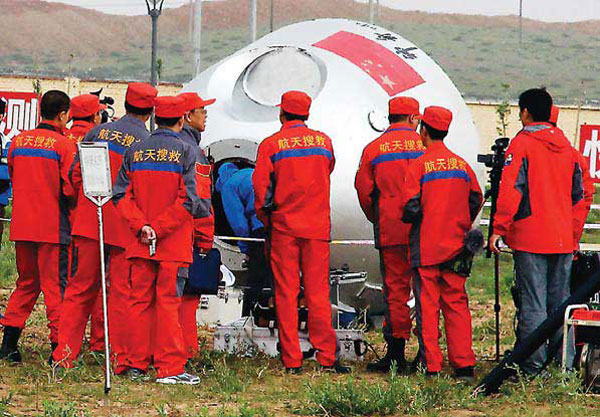
|
 A recovery drill is held on Thursday to rehearse procedure for the landing of the Shenzhou IX capsule in the Inner Mongolia autonomous region on Friday. [Photo by Li Guanjiao /?for China Daily] |
The astronauts bid their farewells on Thursday to the Tiangong-1 space lab module, their home for 10 days, and prepared to return home on Friday.
They completed a manual undocking with Tiangong-1 on Thursday morning.
The Shenzhou IX re-entry capsule is scheduled to return to Earth at around 10 am on Friday, Wu Ping, spokeswoman for the manned space program, said on Thursday.
The capsule, carrying astronauts Jing Haipeng, Liu Wang and China's first female astronaut Liu Yang, will land in the central part of the Inner Mongolia autonomous region.
Yang Zhijie, deputy director of the Inner Mongolia Weather Bureau, said it is the first time that a manned spacecraft will land in the region during the summer. Three earlier manned space missions all returned in the autumn.
"The landing area has unpredictable weather in June and thunderstorms, gales and hailstones are not uncommon," he said.
Fortunately, according to the weather forecast, conditions at the landing site will be suitable on Friday.
The National Center for Space Weather also forecast that solar activity this week will not affect communications between the vessel and Earth.
The launch took place on June 16 and successful dockings, both automatic and manual, were achieved.
"The docking is a technological milestone, and represents a significant advance in capability," said David Mindell, a professor of aeronautics and astronautics at the Massachusetts Institute of Technology in the United States. "It is a difficult task, and also a huge stepping stone toward future advances."
Eileen Collins, a retired NASA astronaut, said that she hoped the crew had enjoyed their time in space. "It's a very wonderful, human experience," she said. "And as a former pilot, I feel a kinship with Liu Yang. I hope that some day we might meet."
Pamela Melory, also a retired NASA astronaut, acknowledged the significance of the docking.
"It is an impressive achievement, and a very difficult thing to do," she said. "From those of us who are passionate about space, we wish them congratulations on their accomplishment. However, I will say that it's not over until it's over. We’ll be watching carefully, and hoping for their safety and success in returning to Earth."
Since starting its manned space mission in 1992, China has spent nearly 39 billion yuan ($6.13 billion) on the program, according to spokeswoman Wu.
Previously the government announced ambitious plans for space travel, including building more powerful carrier rockets and space freighters, and the eventual construction of a space station.
The US and the former Soviet Union led the world in pioneering space travel. The US carried out a space docking in 1966. China is now the third country to successfully demonstrate its technical capability and knowledge for human space travel.
The slow and methodical pace at which China has developed its program is commendable, said John Logsdon, the former director of space policy at George Washington University, and current member of the NASA Advisory Council.
"China has gone about it step by step, with each mission demonstrating new capabilities," he said. "That's a path to long-term, stable and sustainable development. That's probably smarter than what we did, when we rushed to the moon just to get there."
The US still spends $17.7 billion annually on space, Logsdon said.
"We are in a period of transition after the space shuttle," he said. "We are working on developing the capability for human flight beyond Earth orbit, with rockets for deep space. We are in a pause."
The US has also shifted focus to commercial space flight, Collins said. SpaceX, a private company, made history earlier this month when it conducted the first commercial round-trip flight to the international space station.
"It might appear that the US is scaling back because the shuttles are not flying, but the US is working with private companies to develop smaller rockets for space travel," Collins said.
The move toward commercialization is natural, she said.
"This is a normal part of the development of a transportation system," she said.
"In the past, the US initiated the launch of railroads and aircraft, for example, and then over time the private sector took over. Eventually in the US the private sector will own the rockets, operate the missions and NASA will simply purchase seats for missions."
It is unclear whether China will ultimately commercialize its own space industry, Mindell said.
"One of the strengths of the American model is that NASA's spacecraft have always been made by private companies at the direction of NASA. That model has allowed for competition between different players," Mindell said.
"China is where the US has been for over 40 years, and it still has to successfully demonstrate further achievements," Melroy said. "But I imagine they will; it just might take some time."
Contact the writers at kdawson@chinadailyusa.com and xindingding@chinadaily.com.cn